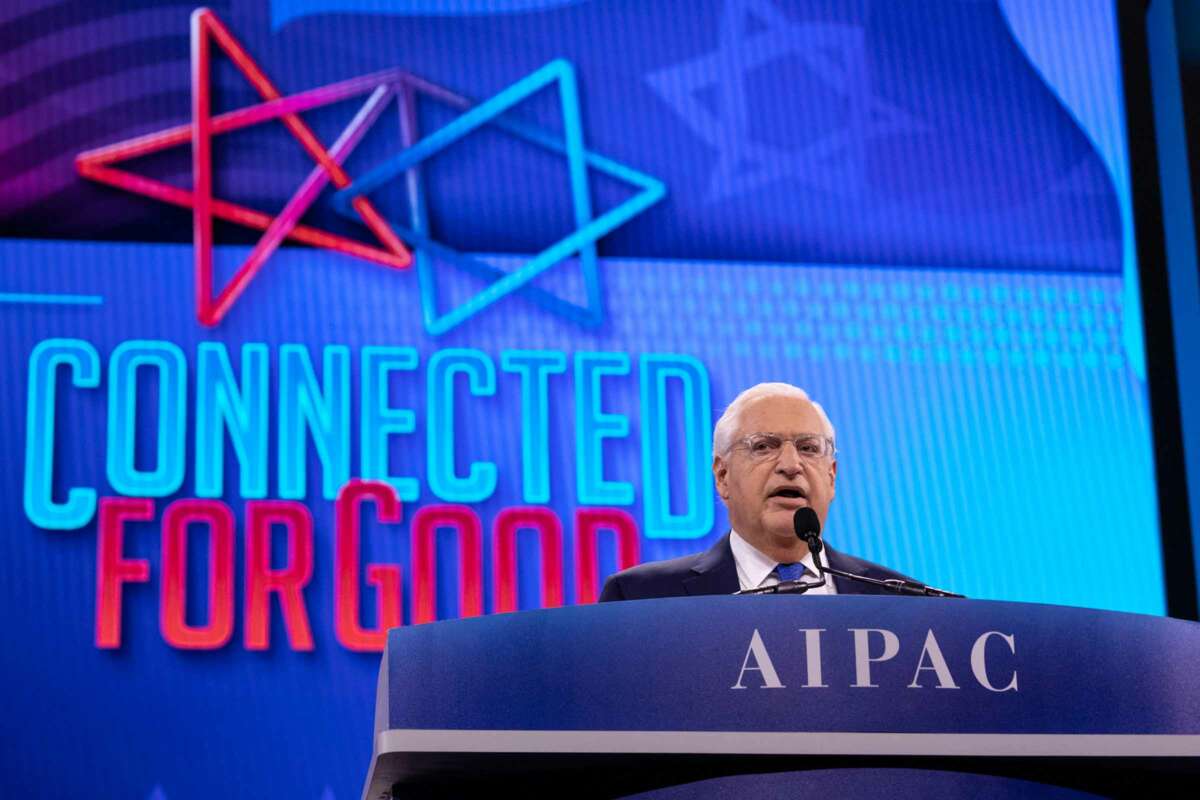Truthout is an indispensable resource for activists, movement leaders and workers everywhere. Please make this work possible with a quick donation.
The American Israel Public Affairs Committee delivered more than $3.7 million in November to the campaigns of U.S. lawmakers, the most it has ever doled out in a single month, according to a new filing with the Federal Election Commission.
The American Israel Public Affairs Committee (AIPAC) has been working to convince members of the U.S. Congress to send more aid to Israel for its war against Hamas and to support primary challengers against representatives and senators who it sees as not sufficiently supportive of Israel’s response to the October 7 Hamas attack.
The largest recipient of AIPAC’s campaign support in November, which came by way of its PAC, was New York Democrat Rep. Ritchie Torres, who was profiled by the New York Times in November as an example of a young Democratic politician who has sided firmly with Israel, as opposed to those in the so-called “squad” of progressives who have spoken critically of the country’s military actions. AIPAC sent Torres more than $201,000 in donations from its PAC in November, according to the filing.
Torres was one of 22 Democrats who voted with Republicans to endorse a resolution censuring squad member Rep. Rashida Tlaib (D-Mich.) for “promoting false narratives” about the October 7 Hamas attack and “calling for the destruction of the state of Israel.” About a third of Torres’ November haul from AIPAC was received by his campaign the day after he voted for the resolution.
AIPAC’s donations were made through its political action committee, which functions as a conduit for the group’s backers. Individual donors use AIPAC’s PAC to earmark portions of their funds to particular campaigns. This arrangement allows AIPAC to make PAC donations to campaigns that are far larger than the $5,000 per election limit that most PACs must abide by under federal guidelines.
Several other Democrats who voted to censure Tlaib were among the top recipients of AIPAC funds in November, including Florida Rep. Debbie Wasserman Schultz ($141,058), New Jersey Rep. Josh Gottheimer ($61,176), and Florida Rep. Lois Frankel ($33,050).
The second-largest recipient in November of AIPAC donations was House Minority Leader Rep. Hakeem Jeffries (D-N.Y.), an ally to Israel. Jeffries has rejected the idea of conditioning how Israel can use the $4 billion in aid it receives annually from the U.S., even as the country moved to reform its judiciary system in ways that critics label undemocratic. Jeffries has repeatedly emphasized his support for Israel throughout its military response in Gaza, saying at a November rally, “Congress will continue to support, in a bipartisan way, the state of Israel and Israel’s unequivocal right to exist as a Jewish and democratic state, always and forever.” AIPAC sent Jeffries just more than $200,000 in November.
Many Republicans also benefited from AIPAC’s donations in November. Among the top recipients were California Republican Rep. Ken Calvert ($99,226), the Speaker of the House Rep. Mike Johnson ($98,336), and Texas Republican Michael McCaul ($98,026), who is chairman of the House Committee on Foreign Affairs. Alabama Republican Mike Rogers, the chairman of the House Armed Services Committee, received over $52,000.
In early November, the House of Representatives passed a Republican bill that would provide Israel with $14.3 billion in aid, with the funding coming from a rescission of the Internal Revenue Service’s budget. On November 14, the Senate voted to table a Republican attempt to vote on the House bill. In early December, the Senate failed to advance a $110 billion package of funding for Israel and Ukraine. Last week, the Biden administration bypassed congressional approval of a $147 million weapons sale to Israel, the second time it had taken such a step that month.
AIPAC’s PAC has already made more than $18 million in campaign contributions in the 2023-2024 campaign cycle, according to the Federal Election Commission. The lobbying group made its first direct contributions to campaigns in late January 2022, although other organizations with ties to AIPAC, such as the Democratic Majority for Israel super PAC, had been spending money to influence elections.
In addition to PAC donations, AIPAC launched a super PAC in 2022 called United Democracy Project that has spent millions of dollars opposing Democrats who it views as not sufficiently pro-Israel and backing those who it considers reliable allies. According to a recent report by Slate, unnamed “close watchers” expect AIPAC to spend at least $100 million in 2024 Democratic primaries, with much of the spending focused on challenging squad representatives.
Holding Trump accountable for his illegal war on Iran
The devastating American and Israeli attacks have killed hundreds of Iranians, and the death toll continues to rise.
As independent media, what we do next matters a lot. It’s up to us to report the truth, demand accountability, and reckon with the consequences of U.S. militarism at this cataclysmic historical moment.
Trump may be an authoritarian, but he is not entirely invulnerable, nor are the elected officials who have given him pass after pass. We cannot let him believe for a second longer that he can get away with something this wildly illegal or recklessly dangerous without accountability.
We ask for your support as we carry out our media resistance to unchecked militarism. Please make a tax-deductible one-time or monthly donation to Truthout.
